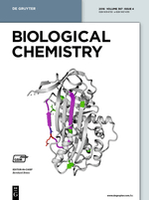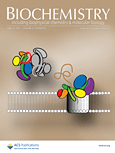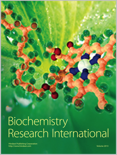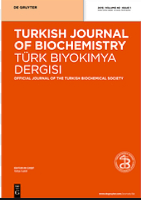
BIOLOGICAL CHEMISTRY
Scope & Guideline
Illuminating the Chemical Foundations of Life
Introduction
Aims and Scopes
- Biochemical Characterization and Mechanisms:
Research articles often delve into the biochemical mechanisms underlying various biological processes, including enzyme functions, metabolic pathways, and molecular interactions. - Phytochemistry and Natural Products:
The journal highlights studies on phytochemicals and their biological activities, including extraction, characterization, and their potential therapeutic effects. - Microbial and Plant Interactions:
Many publications explore the interactions between microbes and plants, focusing on the biochemistry of plant growth-promoting bacteria, pathogens, and their effects on plant health and productivity. - Environmental and Agricultural Biochemistry:
Research frequently addresses the biochemical aspects of environmental science, including soil biochemistry, waste management, and the impact of agricultural practices on biogeochemical cycles. - Innovative Analytical Techniques:
The journal promotes novel analytical methods, such as advanced chromatography and mass spectrometry for the analysis of complex biological samples, enhancing the accuracy and efficiency of biochemical research. - Biotechnology Applications:
Research that applies biochemical principles to biotechnological innovations, including enzyme technology, microbial fermentation, and genetic engineering, is a key focus area.
Trending and Emerging
- AI and Computational Approaches in Biochemistry:
The integration of artificial intelligence and computational modeling in biochemical research is gaining traction, facilitating predictions on molecular interactions and optimizing experimental designs. - Sustainable Biochemistry and Green Chemistry:
There is an increasing emphasis on sustainable practices, including bio-based production methods, waste valorization, and environmentally friendly chemical processes, aligning with global sustainability goals. - Gut Microbiome Research:
The exploration of the gut microbiome's role in health and disease, particularly its biochemical interactions with dietary components and pharmaceuticals, is a rapidly growing area of interest. - Nanotechnology in Biomedical Applications:
Research into the use of nanomaterials in drug delivery, diagnostics, and therapeutics is on the rise, indicating a shift towards the intersection of nanotechnology and biochemistry. - Functional Foods and Nutraceuticals:
There is a notable trend towards studying the biochemical properties of functional foods and their health benefits, focusing on their role in disease prevention and health promotion.
Declining or Waning
- Traditional Medicinal Plants:
Research on traditional medicinal plants has declined as interest shifts towards more systematic approaches to drug discovery and the exploration of synthetic and semi-synthetic compounds. - Basic Microbial Pathogenicity Studies:
Studies focusing solely on the pathogenicity of microbes without a biochemical or therapeutic context have diminished, as the field moves towards integrative approaches that combine microbiology with therapeutic applications. - Conventional Chemical Synthesis:
There has been a noticeable decrease in publications centered on conventional chemical synthesis methods, with a growing preference for greener, bio-inspired synthesis techniques.
Similar Journals

CRITICAL REVIEWS IN BIOCHEMISTRY AND MOLECULAR BIOLOGY
Charting New Pathways in Biochemical SciencesWelcome to Critical Reviews in Biochemistry and Molecular Biology, a premier academic journal published by Taylor & Francis Ltd, dedicated to advancing the fields of biochemistry and molecular biology. With an impressive impact factor and a Q1 ranking in both Biochemistry and Molecular Biology for 2023, this journal serves as a vital resource for researchers, professionals, and students eager to engage with cutting-edge reviews and analyses that synthesize the latest developments in these dynamic areas of study. Since its inception in 1972, the journal has maintained a commitment to high-quality scholarship, providing a platform for critical discussions that accelerate the discovery and understanding of biochemical processes and molecular interactions. Although not open access, its robust editorial peer-review process ensures that published articles meet the highest standards of scientific rigor, making it a trusted source for the scientific community. As we continue to converge toward 2024, we invite you to explore the extensive array of topics and findings that have shaped contemporary biochemistry and molecular biology.

MOLECULAR BIOLOGY REPORTS
Unveiling the intricacies of life at the molecular level.MOLECULAR BIOLOGY REPORTS, published by SPRINGER, is a distinguished journal that serves the vibrant fields of genetics, medicine, and molecular biology. With a rich publication history dating back to 1973, this journal has evolved into a hub for innovative and impactful research, garnering a respectable 2023 Impact Factor indicative of its influence within the academic community. Operating from the Netherlands, it focuses on disseminating high-quality research findings that advance our understanding of molecular mechanisms underlying biological processes. Though not open access, the journal offers various subscription options to ensure accessibility to its comprehensive content. Currently classified in the Q2 quartile in Medicine (miscellaneous) and Q3 in both Genetics and Molecular Biology, MOLECULAR BIOLOGY REPORTS is committed to fostering scholarly dialogue and collaboration among researchers, professionals, and students dedicated to exploring the complexities of life at the molecular level.

BIOCHEMISTRY
Pioneering discoveries that shape the future of biochemistry.BIOCHEMISTRY is a premier academic journal published by the American Chemical Society, dedicated to advancing the field of biochemistry through the dissemination of high-quality research. With an ISSN of 0006-2960 and an e-ISSN of 1520-4995, this esteemed publication has been a vital resource since its inception in 1962 and continues to contribute to the scientific community, boasting a remarkable Q1 ranking in the field as of 2023. The journal's well-curated content emphasizes fundamental biochemical research, molecular genetics, and innovations in biochemical techniques, catering to a diverse audience of researchers, professionals, and students. Although not an open-access publication, BIOCHEMISTRY plays a crucial role in facilitating knowledge exchange and fostering academic collaboration globally, making significant contributions to the understanding of the biochemical processes that underpin life.

BIOCHIMICA ET BIOPHYSICA ACTA-GENERAL SUBJECTS
Driving Innovation in Biochemical and Biophysical StudiesBIOCHIMICA ET BIOPHYSICA ACTA-GENERAL SUBJECTS, published by Elsevier, serves as a pivotal journal in the fields of biochemistry and biophysics, with a long-standing history dating back to 1956. This esteemed publication, bearing the ISSN 0304-4165 and E-ISSN 1872-8006, continuously contributes to advancing our understanding of complex biological processes through rigorous research articles and reviews. It notably holds a distinguished position with a Q2 classification in Biochemistry and a Q1 ranking in Biophysics for 2023, reflecting its high relevance and impact within these scientific domains. The journal is also recognized within the Scopus metrics, taking a rank of #40 out of 152 in Biophysics and #173 out of 438 in Biochemistry, thus placing it in the 74th and 60th percentiles respectively. Academics and professionals in the life sciences will find this journal an essential resource for current research, cutting-edge techniques, and comprehensive reviews aimed at enhancing the understanding of biological functions. While BIOCHIMICA ET BIOPHYSICA ACTA is not an open-access journal, it remains a cornerstone publication for those seeking to stay at the forefront of biochemical and biophysical research.

Biochemistry Research International
Advancing biochemistry knowledge for a global audience.Biochemistry Research International is a prominent and dynamic journal published by Hindawi Ltd, dedicated to advancing knowledge in the field of biochemistry. With its Open Access model established since 2010, the journal provides unrestricted access to high-quality research, thereby fostering global communication among researchers and professionals. Operating out of the United States, Biochemistry Research International serves as a vital platform for disseminating cutting-edge findings in biochemistry and molecular biology, holding a respectable Q2 ranking in its category as of 2023. The journal's scope encompasses a wide array of topics including but not limited to biochemical processes, genetic engineering, and molecular interactions, making it an essential resource for students and seasoned researchers alike. With an impact factor reflective of its significance in the academic community, Biochemistry Research International continues to play an integral role in shaping the future of biochemistry research.

Biochemistry and Cell Biology
Illuminating pathways in biochemistry and cell biology research.Biochemistry and Cell Biology, published by Canadian Science Publishing, is a prestigious journal that has been instrumental in advancing the fields of biochemistry, molecular biology, and cell biology since its inception in 1986. With an impressive scope spanning innovative research findings to comprehensive reviews, this journal serves as a vital resource for researchers, professionals, and students alike. Currently positioned in the Q2 quartile in Biochemistry and Q3 quartiles in both Cell Biology and Molecular Biology, it reflects a robust contribution to scientific discourse, placing it among reputable publications in its field. The journal boasts notable rankings within the Scopus database, highlighting its impact and relevance, and continues to be a valuable platform for disseminating pivotal research. By providing access to a wide array of articles, the journal remains committed to fostering knowledge and collaboration in the scientific community.

Journal of Biological Research-Thessaloniki
Unveiling New Discoveries in Biochemistry and Genetics.Journal of Biological Research-Thessaloniki, published by Aristotle University of Thessaloniki, is a distinguished academic journal committed to advancing the fields of Agricultural and Biological Sciences and Biochemistry, Genetics and Molecular Biology. As an Open Access journal since 2004, it provides a platform for the rapid dissemination of innovative research that spans diverse biological disciplines. With an impact factor that situates it in the Q2 category for Agricultural and Biological Sciences and Q3 for Biochemistry, Genetics and Molecular Biology as of 2023, the journal demonstrates a significant contribution to its respective fields. Located in Thessaloniki, Greece, it serves a global audience of researchers, professionals, and students eager to access quality scientific content. The journal is dedicated to publishing original research articles, reviews, and critical commentaries, encouraging collaboration and dialogue amongst scientists dedicated to the frontiers of biological research.

Turkish Journal of Biochemistry-Turk Biyokimya Dergisi
Uniting global scholars in the quest for biochemical knowledge.Turkish Journal of Biochemistry-Turk Biyokimya Dergisi, published by WALTER DE GRUYTER GMBH, is a pivotal open-access journal in the field of biochemistry that serves as a forum for innovative research and scholarly discourse. Since its inception in 2009 and transitioning to open access in 2015, this journal has gained recognition within the scientific community, reflecting a commitment to advancing knowledge in biochemistry and related medical sciences. With a diverse scope that encompasses molecular biology, clinical biochemistry, and the broader arena of biochemical studies, Turkish Journal of Biochemistry offers researchers, professionals, and students access to impactful studies and current developments. Although currently positioned in the lower quartiles in specific categories, the journal aims to enhance its visibility and engagement as it converges towards a promising future, fostering collaboration and knowledge exchange among biochemists across Turkey and around the globe. This journal is vital for anyone seeking to stay abreast of emerging trends and research findings in biochemistry.

BIOSCIENCE BIOTECHNOLOGY AND BIOCHEMISTRY
Connecting Theory and Application in BiosciencesBIOSCIENCE BIOTECHNOLOGY AND BIOCHEMISTRY, published by Oxford University Press, stands out as a vital resource for scholars and professionals in the fields of biotechnology, biochemistry, and analytical chemistry. With an ISSN of 0916-8451, this esteemed journal has been publishing significant research since its inception in 1988, focusing on the convergence of biological sciences and their technological applications. The journal is recognized within several important categories, holding a Q3 ranking in prominent areas such as Analytical Chemistry, Applied Microbiology and Biotechnology, and Biochemistry, among others, as of 2023. Its diverse scope fosters innovation, inviting submissions that address contemporary challenges and advancements in life sciences. Although currently not open access, it offers invaluable insights and findings essential for researchers, professionals, and students dedicated to pushing the boundaries of science. With its rigorous peer-review process, BIOSCIENCE BIOTECHNOLOGY AND BIOCHEMISTRY continues to contribute significantly to the scientific community, solidifying its reputation as a key publication for those exploring the dynamic interplay of biology and technology.

ELECTRONIC JOURNAL OF BIOTECHNOLOGY
Innovating Solutions for Health, Agriculture, and SustainabilityThe Electronic Journal of Biotechnology is a premier Open Access journal published by Pontificia Universidad Catolica de Valparaiso, Chile, dedicated to advancing the fields of applied microbiology and biotechnology. With its inception in 1998 and an unwavering commitment to sharing knowledge, the journal has garnered a respectable ranking within the Q3 quartile for both its biotechnology and applied microbiology categories as of 2023, reflecting its significance in the academic community. Researchers and professionals will find its editorial rigor complemented by a robust platform for disseminating innovative findings, fostering collaboration, and driving forward biotechnology discussions. Given its inclusive approach, having transitioned to Open Access in 2014, the journal ensures that research is accessible to a global audience, making it a valuable resource for students, academics, and industry practitioners alike. Through the publication of original research, reviews, and critical insights, the Electronic Journal of Biotechnology aims to bridge the gap between scientific discovery and practical application, ultimately contributing to advancements in health, agriculture, and environmental sustainability.